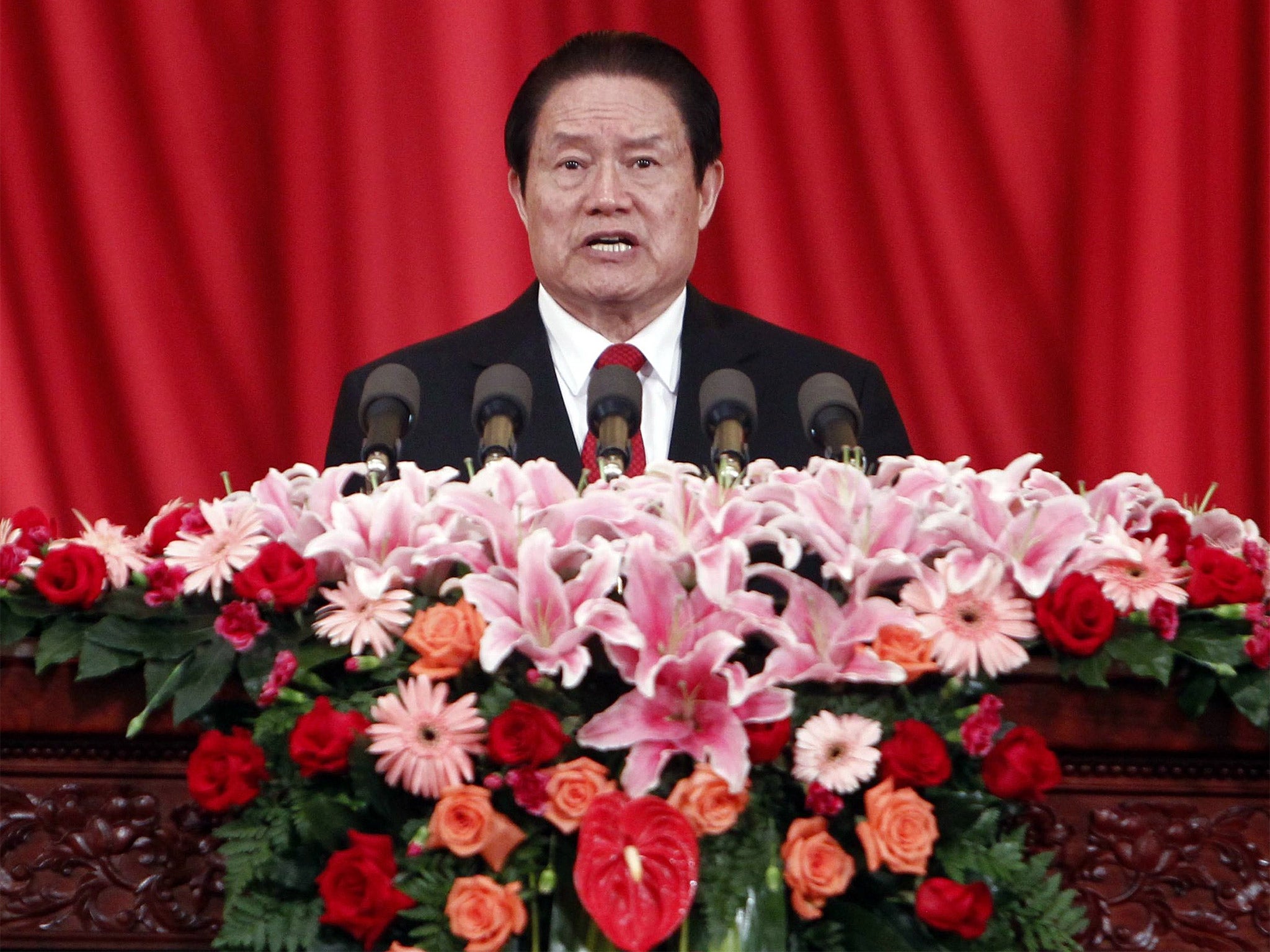How China’s anti-corruption drive claimed its biggest scalp yet - and left the ruling elite fearful of the same fate
Former security tsar, Zhou Yongkang, is being investigated for suspected 'serious disciplinary violations'

Your support helps us to tell the story
From reproductive rights to climate change to Big Tech, The Independent is on the ground when the story is developing. Whether it's investigating the financials of Elon Musk's pro-Trump PAC or producing our latest documentary, 'The A Word', which shines a light on the American women fighting for reproductive rights, we know how important it is to parse out the facts from the messaging.
At such a critical moment in US history, we need reporters on the ground. Your donation allows us to keep sending journalists to speak to both sides of the story.
The Independent is trusted by Americans across the entire political spectrum. And unlike many other quality news outlets, we choose not to lock Americans out of our reporting and analysis with paywalls. We believe quality journalism should be available to everyone, paid for by those who can afford it.
Your support makes all the difference.Two influential former Chinese leaders gave their consent for President Xi Jinping to investigate the former domestic security chief Zhou Yongkang, sources said, in a sign that the corruption investigation will not open a rift in the ruling Communist Party.
Mr Xi would not have been able to investigate someone as powerful as Mr Zhou without the agreement of senior party members and other retired top officials, political analysts said. But less clear is whether the elite is starting to get jittery over Mr Xi’s expanding corruption crackdown, which is spreading fear throughout the party and the government.
Mr Xi’s predecessors Hu Jintao and Jiang Zemin had approved the investigation into Mr Zhou, the most senior Chinese official to be ensnared in a graft scandal since the party swept to power in 1949, two sources with ties to the leadership said.
The party said in a brief statement on Tuesday that Mr Zhou was being investigated by the party’s anti-corruption watchdog for suspected “serious disciplinary violations”.
Mr Zhou, 71, was the security tsar within the Politburo Standing Committee – China’s apex of power – for five years until he retired in 2012. “Jiang Zemin, Hu Jintao and Xi Jinping reached a consensus to deal with Zhou Yongkang for violating party discipline,” one source said.
Former top leaders in China usually wield a lot of influence behind the scenes. Both Jiang and Hu, as former Presidents and heads of the party, still have allies installed in office.
The party statement did not detail wrongdoing by Mr Zhou, but the sources said he had been accused of corruption involving family members and political allies as well as accepting bribes to promote officials. “Not all charges against Mr Zhou would be made public,” added the source, who requested anonymity to avoid repercussions for speaking without authorisation.
Mr Zhou could not be reached for comment. The party statement on Mr Zhou coincided with an announcement that its Central Committee would convene in October to “comprehensively study the advancing of the rule by law”.
Another source with leadership ties said Mr Xi was considering a proposal to let the Central Committee decide whether to press criminal charges against Mr Zhou after anti-corruption investigators detailed their case, as opposed to having the matter dealt with internally by the party. “This would be a first if Mr Xi decides to let the Central Committee vote whether to put Mr Zhou on trial,” the source said.
By breaking an unwritten rule that members of the Standing Committee would not come under scrutiny after retirement, Mr Xi could risk antagonising other party elders who fear that they and their families could be next, political analysts said.
Mr Xi’s campaign has already sown so much fear that many officials are doing anything to stay out of trouble – from dithering over approving major projects to seeking early retirement. Some top executives under investigation at state-owned enterprises have committed suicide.
About 30 senior officials at the provincial and ministerial level or above have been put under investigation for corruption since December 2012, state media has said. The People’s Daily newspaper, the party’s mouthpiece, said the crackdown was not about to end: “There will be no halt. This is only one step in a process. Going forward, whoever is corrupt will be punished.”
In early December, Mr Zhou was placed under virtual house arrest after Mr Xi ordered a special task force to look into corruption accusations against him. Two months later, authorities had seized assets worth at least 90bn yuan (£8.6bn) from family members and associates of Mr Zhou. More than 300 of Mr Zhou’s relatives, political allies and staff had been taken into custody or questioned, said sources who had been briefed on the investigation.
Sources with ties to the Chinese leadership have said Mr Xi wants to bring down Mr Zhou Yongkang for allegedly plotting appointments to retain influence before the 18th party congress in November 2012, when Mr Xi took over the party. Mr Zhou had nominated Bo Xilai to succeed him as domestic security chief and orchestrated Bo’s promotion to the Standing Committee, the sources have said. Bo later fell following accusations that his wife murdered British businessman Neil Heywood in 2011. Bo’s wife was convicted over the killing and Bo was jailed for corruption.
Mr Xi has made fighting graft a major theme of his administration and has promised to go after “tigers” as well as “flies”.
But putting Mr Zhou on trial might risk embarrassing revelations about the party’s inner workings coming to light, said another source.
Join our commenting forum
Join thought-provoking conversations, follow other Independent readers and see their replies
Comments